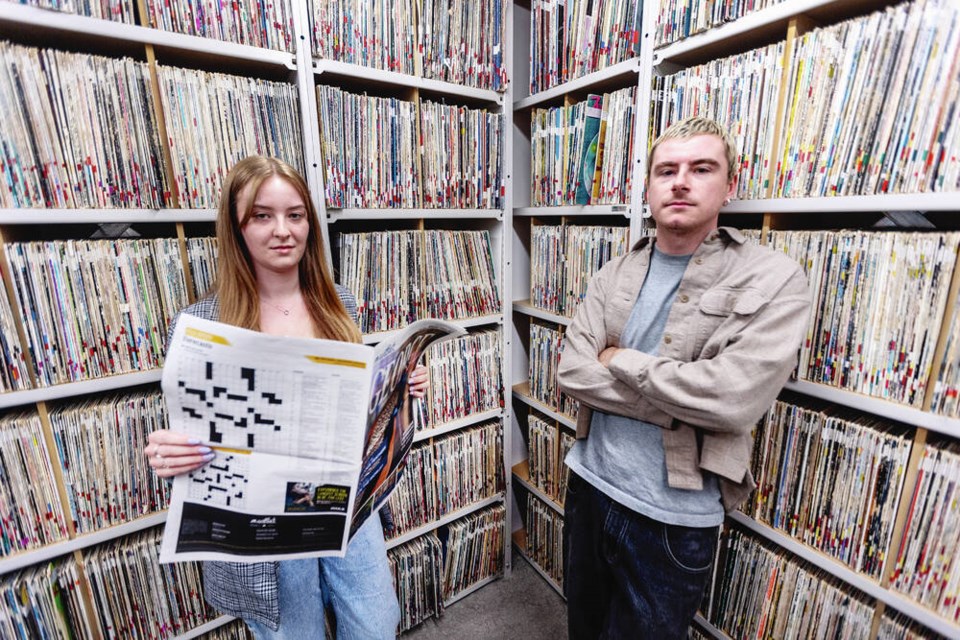Victoria’s student newspapers and community radio station are being blocked on Facebook and Instagram as part of parent company Meta’s response to Bill C-18.
C-18, also known as the Online News Act, was passed in June, and is intended to make companies like Meta and Google pay news organizations when someone gets to a news story through one of their digital platforms.
While the law only comes into effect by the end of the year, Meta is starting to shut out news from its platforms now.
Many media organizations — including the sa国际传媒 — are no longer seeing their content on Meta platforms.
Student organizations were hoping they would slip under the radar, but that doesn’t seem to be the case.
CFUV station manager Rowan Grice said he was surprised to see the mostly volunteer-run station’s social media accounts get caught up in Meta’s news block in early August.
“Lil’ old CFUV?” he asked, sitting at the live broadcast desk inside the University of Victoria’s student union building. “People aren’t coming to us for breaking news.”
The community radio station has co-hosted Eventide, a free music series at Centennial Square, for the past 10 years, but since the block began, fewer people have been attending, a phenomenon Grice attributed to the changes on Instagram.
CFUV’s audience reach on Instagram has plummeted by more than 90 per cent, Grice said. “There’s a certain demographic — myself included — [that] for better or for worse, gets a lot of information and news about local things from Instagram.”
Under the station’s broadcasting licence, it is mandated to carry 15 per cent news content, largely filled by news podcasts such as the homegrown U in the Ring and syndicated content from outlets such as sa国际传媒land.
Campus stations would be eligible for payments under C-18.
Grice said the community radio station is one of the few spaces where people can experiment and try out creative pursuits such as podcasting and hosting radio shows in Victoria.
Across the hall, the Martlet, UVic’s independent student newspaper, also saw its Instagram and Facebook accounts blocked.
Editor-in-chief Ashlee Levy, who was in the process of hiring the Martlet’s part-time staff for the next school year, said it’s been a stressful time, as much of the paper’s community engagement occurs on Instagram.
The Martlet has only produced a print edition once a month since the summer of 2021 due to rising costs of production and the demands print editions place on its small staff.
Levy said she has faith that the Martlet’s regular readers will follow the newspaper wherever it goes.
“But in terms of bringing new readers and new volunteers and making sure that people who don’t already follow us can find us, it’s definitely going to be a challenge,” she said.
Many of the paper’s volunteers and readers come through Instagram, Levy said.
The Martlet is now promoting its work through an email newsletter and social media channels such as TikTok, Levy said.
Andrew Mrozowski, president of Canadian University Press, a student newspaper co-op and newswire service, noted that the online changes follow years of student newspapers making the shift away from newsprint.
“How are we supposed to inform communities now if we don’t have access to the single most impactful tool that affects people [of] our generation?” he said.
“Student press plays a critical role, not just on our campus communities of holding the university and student unions accountable, but also to provide a different perspective.”
Canadian University Press will soon take an official stance on C-18 now that publications are facing the ramifications of the bill, Mrozowski said.
“We wouldn’t have been entitled to the bargaining that this bill is allowing the organizations to do,” he said. “We’ve been caught in the crossfire.”
Greg Pratt, managing editor of Nexus, Camosun College’s student newspaper, said the block is getting in the way of the “good, honest representation” of Camosun by the paper’s student writers.
“Having open access to media is incredibly important in a democratic country,” he said. “So to effectively shut that out through some of the largest ways people access information is extremely, extremely bad precedent.”
The back page of the latest Nexus issue references C-18, telling readers to “flip ’em the bird” and read Nexus coverage on its website and Twitter.
Media outlets can’t just rely on print products anymore, Pratt said. “This isn’t 20 years ago. It’s much harder to compete with people having everything on their phones.”
Meta spokesperson David Troya-Alverez said in a statement that blocked publications that believe they don’t fit into sa国际传媒’s legislative definitions of a news outlet can request a .
Troya-Alverez did not answer questions about when or how student publications could be allowed back onto the platform.
Kim Bolan, a journalism instructor at Langara College and a Postmedia reporter, said she was disappointed to see student newspapers dragged into the C-18 debate.
“Regardless of what one thinks of the legislation, non-profit student newspapers shouldn’t be impacted,” she said. “Meta should rethink that position.”
>>> To comment on this article, write a letter to the editor: [email protected]



